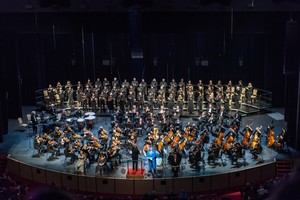Martin Sherman’s 1979 West End and Broadway play, Bent, played a major role in revealing the Nazi persecution of homosexuals in 1930s Germany, leading to thousands being sent to concentration camps. Identified by pink triangles, homosexuals were considered the lowest rank of those imprisoned. Four decades after its premiere, the play still retains its shocking and affecting theatricality, now with heightened relevance to any group of people stripped of freedoms because they are considered different from the majority or those in power.
The Justice Theater Project’s mission of giving voice to social concerns is well served by Bent, especially with this production’s strong cast and impressive technical elements. The director’s warmer, less brutal approach to the script has its rewards, although it lessens the impact of some of Sherman’s intended effects.
The play begins lightheartedly in 1934 in the Berlin apartment of Max, a boastful playboy, and his current boyfriend, Rudy, a dancer in a gay nightclub. When Wolf, a man Max invited home with them, emerges from the bedroom, the comic mood is instantly altered into frightening terror when Gestapo officers burst in. They arrest Wolf because he’s the boyfriend of a leader in the Brown Shirts, who are being purged by Hitler.
Max and Rudy manage to escape, but need to leave Berlin. They prevail on Greta, the drag singer who runs the gay nightclub, to give them money to do so. They live in hiding for years, with help from Max’s gay uncle, Freddie. Reduced to living in the woods, they are finally discovered and put on a train to Dachau, the concentration camp.
Rudy doesn’t survive the trip, but Max does, with the help of a fellow gay prisoner, Horst, who tells Max not to acknowledge his connection to Rudy. At Dachau, Max pretends to be Jewish to avoid wearing a pink triangle and also arranges for Horst to be his work partner moving rocks. The two develop a relationship that can’t be physical under the guards’ surveillance, but they substitute words and imagination to be “together” while standing on a work break. Although there’s a tragic outcome for both, their defiance of attempts to deny them their freedoms is moving and inspirational.
On opening night, the cast was gratifyingly even, from supporting players to leads. Jim O’Brien was coldly menacing as a Nazi officer at Dachau, along with Alex Lewis as his subordinate. Mac McCord made closeted Uncle Freddie into a quietly humorous cameo, while Gus Allen invested Wolf with amusing lustfulness. Michael Lester was particularly gripping as the aging Greta, admonishing Max and Rudy about their obliviousness to their dangerous situation, all while removing his wig, dress, and make-up.
Brenton Blakesley found the right innocence and flippancy for Rudy, his childlike concerns about losing his dance lessons and leaving his houseplants were tragic in their naiveté. Justin Brent Johnson brought a charming warmth and witty personality to Horst, his growing love for Max astutely calibrated.
Sean Wellington impressed with his stamina as Max (he was rarely off the stage in the show’s two acts) and with his commitment to the role’s demands. Although a dislikable character at first, Max eventually opens up to real love with Horst, making Max’s ultimate sacrifice deeply affecting.
Director Joel Rainey’s decision to make Sherman’s Brecht-like script more real and personal added welcome warmth and humor, and was especially rewarding in the lengthy scenes between Max and Horst. Rainey’s method of achieving this was to have the actors speak in more natural, less theatrical tones and play most scenes with quiet intimacy.
But what was gained by that did not outweigh the effect it had on the production’s pace and energy. Many scenes were so relaxed and low-key that they dragged and lost dramatic momentum. The actors used near-whispers in so many scenes that some important dialogue went by without being properly pointed up. The second act, in which Sherman intentionally makes the dialogue and action repetitive to represent the boring work Max and Horst do, lost the inherent tension in which both are constantly under threat of discovery. Sherman’s several bombshells still made their impact, but, in general, the dramatic thrust was too smoothed out.
High praise is due for the production’s technical side, one of the company’s best efforts. Tab May’s compact set cleverly went from apartment to boxcar to barracks, with the second act’s imposing backdrop of an electrified barbed-wire fence supplying the horror of the prisoner’s situation. Darby Madewell’s lighting design provided appropriate atmosphere for sunshine and shadow, particularly in the changing seasons of Act II.
Juan Isler’s sound design encompassed natural sounds in the park and forest and harsh clangor of concentration camp life. Brenda L. Hayes’ period costumes and prison uniforms added realistic detail.
Those familiar with the show may find this production lacking in some expected potency and vigor, but it should provide first-time viewers with the relevant points Sherman makes. Supporters of The Justice Theater Project should come away impressed with the company’s professional progress that the production demonstrates.
Bent continues through Sunday, February 18. For more details on this production, please view the sidebar.












